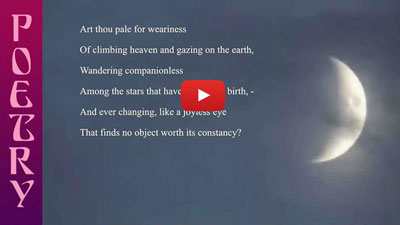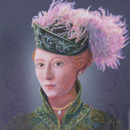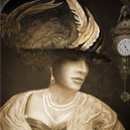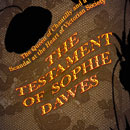19th-century poetry - briefly and at its best
Transcript
Art thou pale for weariness
Of climbing heaven and gazing on the earth,
Wandering companionless
Among the stars that have a different birth, -
And ever changing, like a joyless eye
That finds no object worth its constancy?
Of climbing heaven and gazing on the earth,
Wandering companionless
Among the stars that have a different birth, -
And ever changing, like a joyless eye
That finds no object worth its constancy?
Insights, themes and ideas for interpretation
● These brief lines are classified as being a ‘fragment’ rather than a full poem, and are often linked with a few other lines to the Moon, not shown here. The piece does have a coherent structure and meaning, however, and in the way of many a Romantic poem, places the human spirit absolutely in tune with the physical world.
● At night, the poet gazes on the Moon and wonders at it’s origin - its reflective surface resonating with his thoughts. Here, the moon is 'pale' - like the love-sick poet. 'Weariness' too, because he has fought hard and suffered for his art. Like the poet, the moon climbs the heavens, the dizzy heights of inspiration and creative ecstasy, and like the poet it too gazes down upon the mortal earth, viewing it all from an inevitable distance, not only of space and time, but of understanding, too.
● Even the common multitude of stars are not friends to the moon, or to the lonely poet. They are remote and unmoving, having a different birth, a different origin. The moon, meanwhile is forever changing. It is always showing us a different form, a different face each night - changing like a joyless eye, who finds nothing worth dwelling upon, 'no object worth its constancy.'
● Water and the ocean, frequently associated with the Moon in all manner of mythology and folk stories, played an important role in Shelley's life as well as in his death. His first wife, whom he treated rather badly, drowned herself in London's Serpentine in Hyde Park, and Shelley himself died at sea. (Biography)
● Romantic verse of this kind provides a kind of solace for one who might feel a sense of alienation from humanity. Yes it is aloof in tone, and it is decadent in its romantic self-indulgence. But Shelley makes no apology for this, and neither should we for enjoying it. Although he proclaimed himself to be an atheist at one stage in his life, Shelley has placed in these lines a persuasive mystical impulse - and something therefore well suited to the modern mind-set. It is through ideas of this kind that the full potential of the human spirit can be celebrated and liberated from the banal.
● At night, the poet gazes on the Moon and wonders at it’s origin - its reflective surface resonating with his thoughts. Here, the moon is 'pale' - like the love-sick poet. 'Weariness' too, because he has fought hard and suffered for his art. Like the poet, the moon climbs the heavens, the dizzy heights of inspiration and creative ecstasy, and like the poet it too gazes down upon the mortal earth, viewing it all from an inevitable distance, not only of space and time, but of understanding, too.
● Even the common multitude of stars are not friends to the moon, or to the lonely poet. They are remote and unmoving, having a different birth, a different origin. The moon, meanwhile is forever changing. It is always showing us a different form, a different face each night - changing like a joyless eye, who finds nothing worth dwelling upon, 'no object worth its constancy.'
● Water and the ocean, frequently associated with the Moon in all manner of mythology and folk stories, played an important role in Shelley's life as well as in his death. His first wife, whom he treated rather badly, drowned herself in London's Serpentine in Hyde Park, and Shelley himself died at sea. (Biography)
● Romantic verse of this kind provides a kind of solace for one who might feel a sense of alienation from humanity. Yes it is aloof in tone, and it is decadent in its romantic self-indulgence. But Shelley makes no apology for this, and neither should we for enjoying it. Although he proclaimed himself to be an atheist at one stage in his life, Shelley has placed in these lines a persuasive mystical impulse - and something therefore well suited to the modern mind-set. It is through ideas of this kind that the full potential of the human spirit can be celebrated and liberated from the banal.
Technical info’
Type of Poem =
a short ‘meditative’ piece, really no more than a fragment, of six lines.Rhyme Scheme =
ABAB CC.Meter =
variable: elements of trochaic trimeter and iambic pentameter but with an occasional extra syllable.Georgian novel
Historical Novel
Belle Epoque
Victorian Gothic













